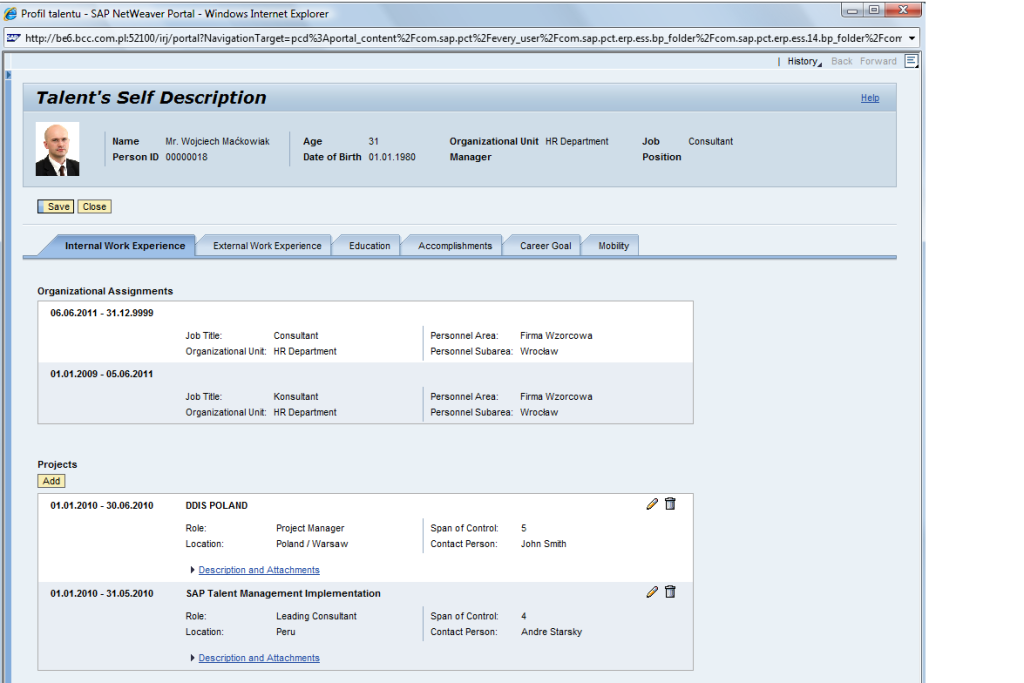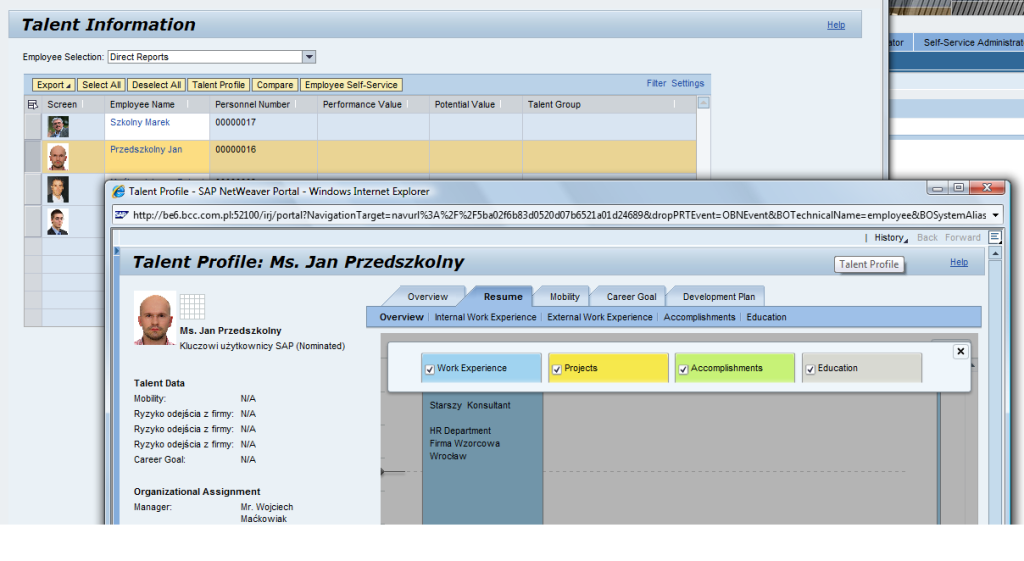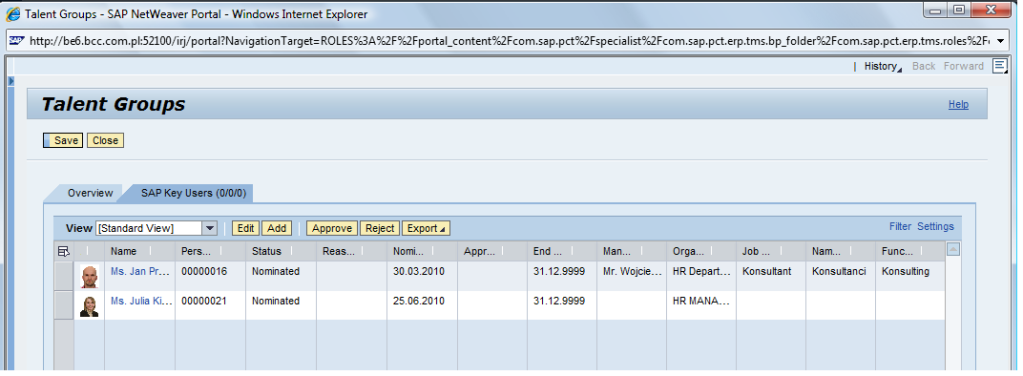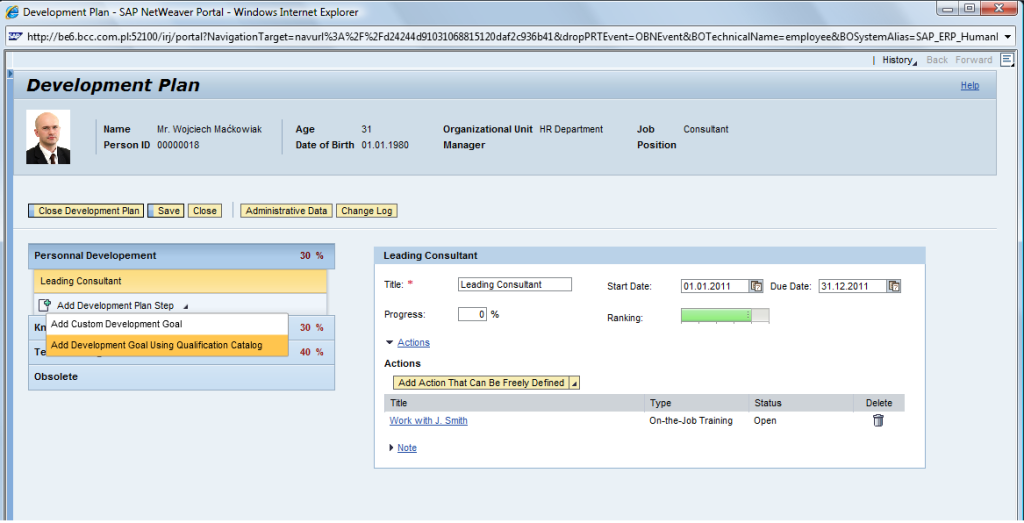In many companies, the employee information – their skills, experience and training courses – is dispersed. Some of the data is stored in SAP HR, others in offline documents, some information (for example about the future personal development plans of the employee) is known only to the immediate supervisor. Some important data is not collected at all.
Effective talent management requires a comprehensive approach, involving a combination of traditional human resources management with unification of procedures for the entire organization.
Talent management is a very broad term that can be understood variously in companies depending on the business activity profile, headcount and even, size. It is related to the strategy of employment, training, career development, approach to employee assessment or effectiveness. However, regardless of the business conditions, modern-managed organizations are interested in the effective management of employee skills and the development of their key competences.
SAP HR supports a wide range of processes designed to develop talent in the organization. The skill management module facilitates, among other things, a working out of the skill directories, position profiles, a comparison of employee skill profiles and requirements of the positions or also help in the identification of potential successors. The Employee Development module provides tools for the creation of short- and long-term plans for employee development. The Training Management component ensures an integrated environment for knowledge management in the organization.
The Talent Management solution can interact and complement the functions of the aforementioned components of SAP HR system, as well as tools for succession planning, employee assessment or remuneration management. Tools available in the SAP HR system are so extensive, and at the same time universal, that they will satisfy even the most complex needs in this scope.
In the latest extension of this SAP HR tool, available in the EHP4 update package, the comprehensive solution for talent management and employee development has been made available in the release based on the SAP NetWeaver Portal environment.
One set of objects and master data as well as a uniform organizational structure enables the restriction of a number of duplicated data and errors, which facilitates work and influences data security. For application users, the solution is easily accessible through portal environment, which provides intuitive and visually appealing interfaces.
The scope of talent management functionality in SAP HR allows you to discover the potential of employees, as well as the creation of a talent database, which can be used for internal recruitment.
In the process of talent management, the SAP HR specifies three basic actors: employee, manager and HR specialist, who is the administrator of the talent management process. These roles include the functions that are determined by the system – out-of-the-box tools for use in SAP that are the basis for the development of talent management processes.
Employee profile
Employees can be motivated by individually setting goals, a precise determination of career and development plans and remuneration programs related to results.
Planning a career path through Employee Self Service or together with the supervisor, the employee has the opportunity to develop one’s own talent and skills profile.
By comparing one’s own qualifications with the requirements assigned to the position, the employee may identify his own gaps in the necessary skills and knowledge, and then plan to develop them. The employee may also review the process of his own evaluation and self-evaluation or the evaluation of co-workers.
The employee is provided with tabs, in which she/he may characterize his own profile, for example previous professional experience and experience in the company, education, professional achievements, knowledge of foreign languages, mobility etc. The tabs are defined in accordance with the requirements of the company as regards this information, which is to be gathered about the employee. Attachments may be added to the characteristics (e.g. certificates, diplomas).
The profile prepared by the employee is a data source for the managers making decisions in the talent management process.
Manager as talent guard
The person who has a decisive role in the process of talent management is the manager. As part of the application, the manager, among others, may:
- organise the reviews of talent profiles prepared by the employees,
- appoint groups referred to as “talent groups” and assign the selected employees to them,
- assess the talents in the management process,
- participate in periodic talent reviews (Talent Review Meetings),
- appoint the team and individual goals in the assessment process,
- have insight into the talent calibration grid
These tools make it possible to keep the talent management policy in the subordinate team so that the individual goals of the employees overlap with the goals of the team or department and organization as much as possible.
Thanks to the precise knowledge available in the talent profiles, it is possible to create effective incentive programmes, including individual career paths and personal development goals to introduce rules for remuneration linked to performance.
Tools available for the analyses and reporting enable one to shape the employee’s skills at a general level and include the company business plans in the talent development, e.g. knowledge of foreign languages in case of foreign expansion plans or investment in specific qualifications, if the company plans to launch a new business line).
The solution allows succession planning, for example by creating groups of employees with high potential, who should be promoted to managerial positions in the future. This strategy of creating the „manager mill” makes it possible to avoid problems connected with vacancies in key positions in the company.
These employee profiles may be used in the recruitment process, both internal and as concerns new employees, as the base for candidates with specific and comparable levels of skills or experience. When planning a programme of employee training, we are able not only to specify the expected effects in the context of company goals, but also adapt the educational paths to the individual needs of the employee or employee groups.
As a result, the wide range of talent management possibilities facilitate an increase of effectiveness and management of the performance in line with the company’s strategy.
Coordination and administration
The administrator of the talent management process is usually a specialist from the personnel department. Thus, it is possible to coordinate and integrate the activities connected with the human resources management, including also talent management from the viewpoint of the entire organization. The tools and views in SAP Portal are also prepared for this viewpoint. At the administration level, it is among other things possible:
- to manage the talent groups,
- to analyse the skills and qualifications of employees and employee groups,
- to create development plans and to monitor the progress of the company’s goal achievement,
- to organise a talent review (Talent Review Meetings),
- to analyse the effects of the incentive programmes, also including those connected with remunerations.
- to provide talent calibration grids with the capability of transferring the employees across the calibration grid dimensions.
As part of Talent Management, SAP provides many out-of-box reports and predefined processes. It is also possible to add new functions and freely connect and flexibly develop the tools, so it is fully possible to adapt them to the processes modeled in the company. The tools from the Talent Management groups may be entirely integrated with other functionalities of the SAP system, which is particularly important in the case of handling complex processes. The advantage of this solution is also its full availability through SAP NetWeaver Portal for wide groups of users and modern interface visualizations.
If a concern for talent is one of the most important issues of a company development strategy, then the extension of SAP HR functionality using the latest solutions will not only support the identification and retention of the most valuable employees, but also develop their skills and monitor progress, and as a result plan the human resources development in the long term perspective while monitoring the profitability of expenditures for this goal.
Own talent description – a sample view of SAP NetWeaver for the employee:

Own talent description – a sample view of SAP NetWeaver for the employee
Talent profiles – sample views of SAP NetWeaver Portal for managers:

Talent profiles – sample views of SAP NetWeaver Portal for managers
Talent group management and development plan creation – sample views for administrators:


Talent group management and development plan creation – sample views for administrators


